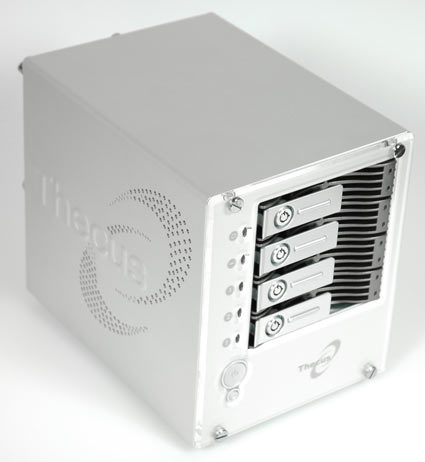Thecus N4100 Brings Storage Space To Your LAN
Get Tom's Hardware's best news and in-depth reviews, straight to your inbox.
You are now subscribed
Your newsletter sign-up was successful
The Network-Attached-Storage Cube
While large hard drives have recently come down in price and usually offer more than enough storage capacity for the typical home user, data storage is a much more sensitive and complex topic in a corporate environment. While flexibility is important there, the main priorities are obviously the security and integrity of the stored files. This in turn makes proper storage solutions more complex, elaborate and, as a result, costly.
Today, several companies are active in this market segment. On the one hand, we have the well-established players such as Adaptec, Dell, EMC², HP/Compaq, IBM, StorCase (Kingston) as well as a few others. These companies offer solid solutions built around proven technology. The downside is that their prices often exceed the budget of budding and small companies.
On the other hand, we also have more and more Taiwanese companies entering this segment, which has traditionally been dominated by European and American firms. Be it Acuta, Proware or, in this case, Thecus, they all want a piece of the growing market for storage solutions. (By the way, Thecus is a spin-off of the well-known Taiwanese motherboard maker, Abit.)
The entry of younger firms into the semi-professional and professional markets has only become possible with the broad availability of new technologies such as Serial ATA, which pairs sufficiently high performance with a flexibility previously unknown in the low-price segment. Even today, hard drives offer the best bang for the buck as far as storage options go. Controller logic has also made great strides, making it suitable for more demanding tasks. Of course, they're still not in a position to threaten high-end storage solutions, which are in a class of their own.
In the business segment, we see a trend of companies moving away from classical storage solutions based on dedicated servers equipped with SCSI drives. While such an approach continues to offer very good performance, its downside is that the server-based array and the server's other functions and services are inextricably linked. As a result, maintenance of one component usually means downtime for the remaining components as well. Then there is also the cost of the server, in terms of both hardware and operation.
Instead, the storage solutions of the future will consists of nearly ubiquitous, independent solutions that can build on existing infrastructure. By this, we mean a working, reliable and, above all, fast network topology. The most important terms in this context are NAS (Network Attached Storage), which describes providing shared storage space across a network, and SANs (Storage Area Networks). This second term stands for the use of network technologies for storage applications such as iSCSI (Internet SCSI). The N4100 falls into the category of NAS devices.
Get Tom's Hardware's best news and in-depth reviews, straight to your inbox.

Patrick Schmid was the editor-in-chief for Tom's Hardware from 2005 to 2006. He wrote numerous articles on a wide range of hardware topics, including storage, CPUs, and system builds.
